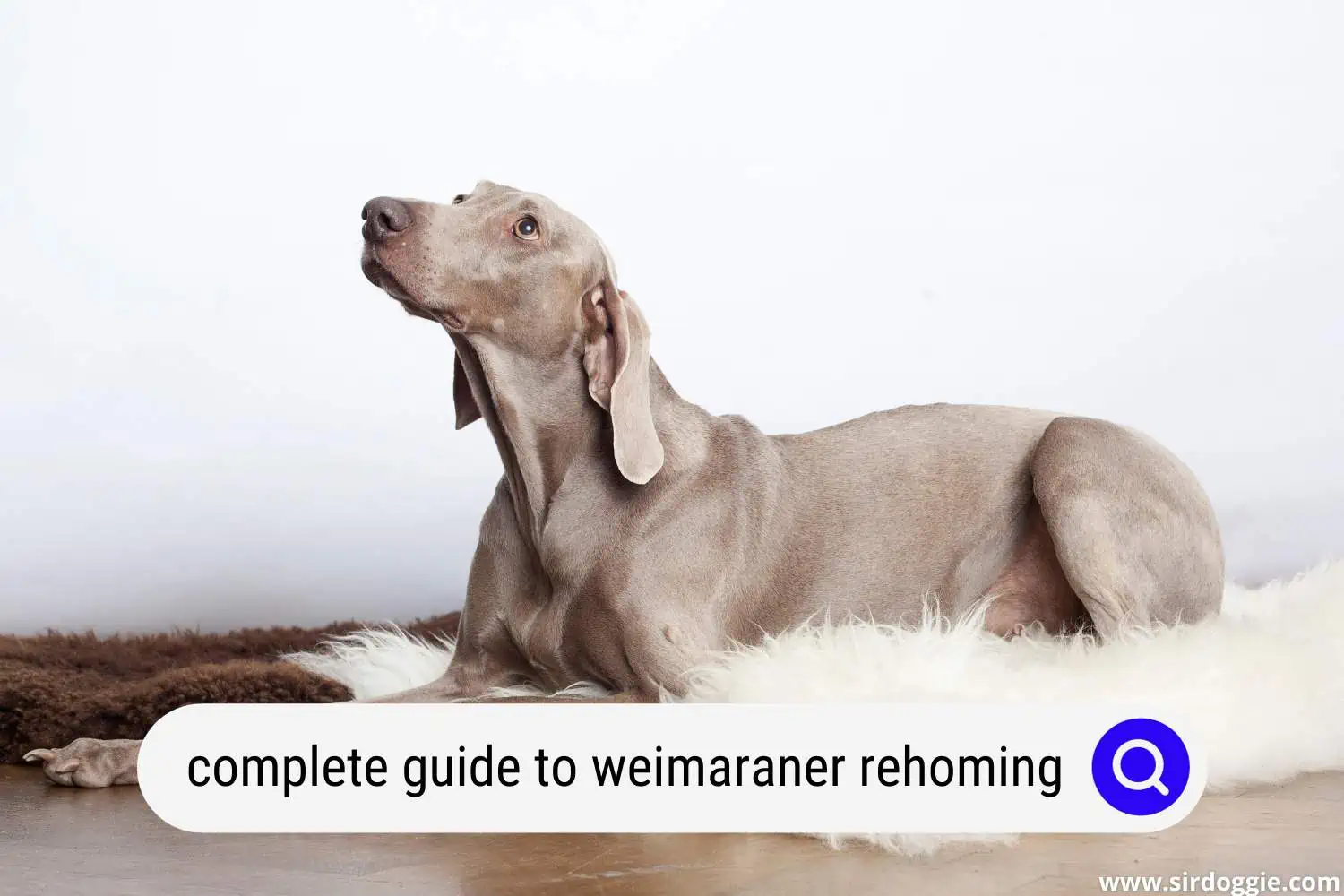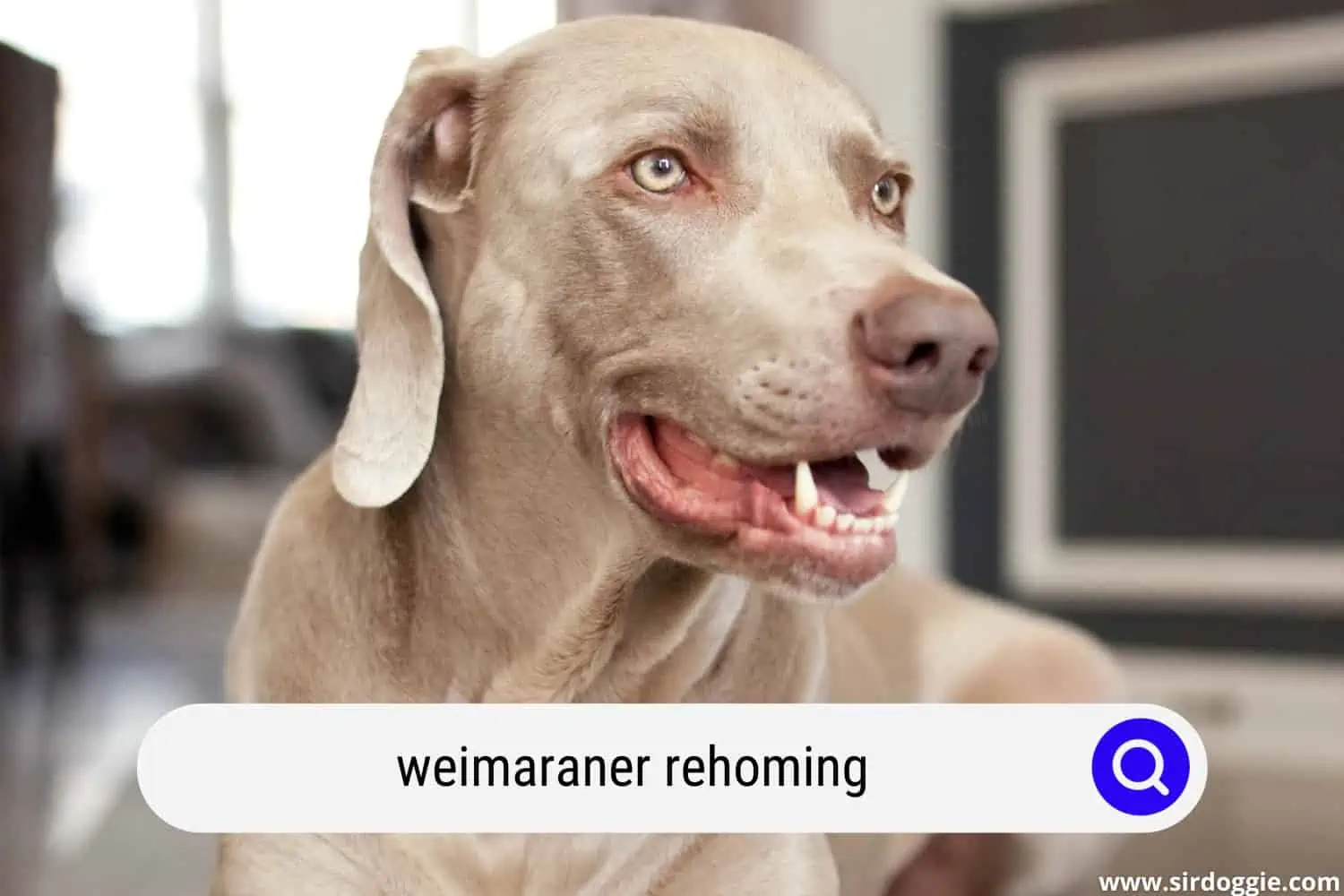Complete Guide to Weimaraner Rehoming
Weimaraners are noble and hardworking pointing dogs that are still preferred for hunting today. However, with enough exercise and activity, a Weimaraner can also be kept as a loyal family dog. The Weimaraner is a versatile hunting dog that is also becoming increasingly popular as a family dog.

Many people are fascinated by its elegant physique and proud expression. Its reliability, the strong bond with people, and its willingness to learn are not only appreciated by hunters.
In our guide, you will find out for whom a Weimaraner is suitable, what demands the dogs place on their owner, and what you have to pay attention to when keeping. We will also give you tips on what to consider when buying or adopting a puppy.
Knowing your Weimaraner ahead
Weimaraners are beautiful, powerful dogs. It is a medium-sized, sinewy-built dog with strong muscles. It has an imposing appearance and looks very elegant in its entire body. The friendly face is framed by two large hanging ears. With its amber-colored eyes, the Weimaraner will give you attentive and loving looks. They are still sky blue when they are puppies.
The fur is gray and may be short or long. Long-haired Weimaraners differ only slightly from their short-haired conspecifics.
The Weimaraner is a passionate hunting dog. It loves challenges, is persistent, and is very self-confident. Its whole being is geared towards being obedient and loyal to its master. The Weimaraner does not have a pronounced temperament, but he has a strong protective instinct.
This is mainly because it is extremely attached to his master. On the one hand, this property offers the advantage that it is very easy to handle and easy to train. On the other hand, it does not hesitate to defend its family from strangers, which you must take into account before purchasing or adopting.
The versatile character of the Weimaraner makes it a loving companion who, however, needs a consistent and sensitive upbringing.
The clever dogs don’t want stupid orders, but rather respectful treatment. Nevertheless, you have to be dominant towards the dog. Otherwise, you will quickly have problems with your Weimaraner in dealing with other animals and people.
Weimaraner pre-homing tips
Before you embark on the adventure of adoption, here are 4 tips to make sure everything goes well.
1. Take the time to find out if you are ready
Before you jump into adoption, ask yourself the right questions. A Weimaraner brings a lot of joy but also some constraints.
Are you ready to go with it? If you do decide to adopt a young puppy, it won’t be clean right away and its excesses may frustrate you. Will you be patient enough to go over it for a few months and take the time to train it?
A Weimaraner lives between 11 and 14 years on average. Will your personal and professional situations still be compatible with the presence of an animal?
Finally, taking care of a Weimaraner comes at a cost, between the visits to the veterinarian (many times during the first months and more and more when the animal gets older). The food, toys, accessories, etc., are you ready to spend on its well-being? Will you have a solution to have your pet looked after during the holidays?
It is very important to take the time to answer these questions. If you don’t feel ready, it’s okay. The time will come when you are and this time will be the right one. There’s no point in adopting an animal on a whim.
2. Purchasing a Weimaraner
If you would like to buy or adopt a Weimaraner, contact a breeder who is registered with a Weimaraner Club. If you’re not a hunter, it will most likely take a little persuasion until the breeder sells you a puppy.
A reputable provider will ensure in advance that you can handle the dog and that it will be placed in competent hands.
In any case, make sure that the breeder does not offer any blue or black Weimaraners, as these are not approved for breeding.
Before buying, check that the puppies are dewormed and chipped, and also check the pedigree of the parent animals. At the Weimaraner Club, you will find tips on how to recognize authenticity.
A purebred Weimaraner puppy costs around $1000. Don’t be tempted to dump offers. If you want to buy a cheaper Weimaraner, you better stop by the animal shelter. In addition to pure-bred animals, a Weimaraner mongrel is occasionally looking for a new home there.
3. A Weimaraner baby or a Weimaraner adult?
Weimaraner puppies are cute. You may think it’s a no-brainer to adopt an animal as young as possible, to be able to discover its character and train it as you wish.
However, taking and rehoming a young animal like a Weimaraner can be a gamble. During the first months, they will not be clean and will do stupid things.
Adopting an adult animal can be just as satisfying. There are no surprises about the animal’s future character since it is already well-defined. It won’t take time for you to know if it is rather fearful, cuddly, or playful.
For the adult Weimaraner, the training is already done. You will save yourself long hours of repeating orders such as “sit,” “lié,” “don’t eat,” etc., which can be exhausting. And above all, it is very generous to adopt an adult animal. It gives them a second chance in life and allows them not to age in a shelter.
Adopting adult Weimaraners who have already known one or more families doesn’t mean they will have less love to give. It will perhaps be a little more suspicious depending on what it has gone through. But it will have just as much love as a young animal that discovers life on its four legs.
4. Trust your intuition
It’s normal to be afraid of making the wrong choice and stumbling upon an adoption error, an animal whose character doesn’t suit yours or your way of life. This is why you must let your intuition speak when choosing.
Yes, a young Weimaraner is cute, it makes you crack. Yes, all puppies look adorable, but let the animal come to you. Having to force contact is a bad sign. Wait until they come to see you and get to know them.
How to rehome a Weimaraner
Here are tips for managing a Weimaraner in its new home. These include offering it the right environment, engaging, training, and managing its challenges.
1. Prepare your Weimaraner its environment, bowls, distractions
Have you found your perfect companion? Congratulations! Many years of happiness await you. But for everything to go well, it is important to prepare its environment before it arrives at its new home.
If you live in an apartment, remember to offer all possible activities. A Weimaraner is a very active dog. It needs height, a clear field of vision on the outside, (false) prey to hunt, and especially well-defined places according to their needs.
Place its bowls (food and water) in a place where it can eat quietly when it wishes and choose a place out of sight to put its litter box, where it can defecate without feeling observed.
2. Engaging your Weimaraner
If you plan to take your Weimaraner out, don’t let it wander right away. Wait at least a week so that it will get its bearings inside. Once you feel it is ready, walk it outside and bring it in after a few minutes but don’t let it go alone for the first few times.
Above all, be available the first few days after its arrival to avoid leaving him alone for too long. This is even more so if you have a young puppy who may quickly become anxious. Contrary to popular belief, Weimaraners don’t like solitude so much. They too need attention, and presence, especially in the early days.
If you are not looking to get a Weimaraner for hunting but want to rehome it as a family dog, you have to offer it appropriate alternative activities. That means lots of exercises, long walks, and intellectual tasks in the form of dog sports or search games.
Since Weimaraners were born to track down and retrieve, nose work is ideal. You can easily integrate this into everyday life.
Nowadays many dog sports and training opportunities represent a good alternative to hunting. These include man trailing, dummy work, tracking, or training to become a rescue dog.
As you can see, your dog’s mental and physical workload will take a long time. You can easily take it with you for jogging, hiking, or cycling and spend a lot of time with it in the fresh air.
You will be rewarded with a dog who is loyal and obedient to you for life and accompanies you in all situations. However, if you neglect your dog and under-challenge it, it will quickly become a “problem dog”.
3. The Weimaraner takes up a lot of time in keeping and training
Weimaraners are preferably given to hunters who use them as working dogs. Keeping a family dog is also very possible if you already have a lot of experience in dealing with dogs and offer it enough alternatives to live out its hunting instinct. It is also quite suitable in dealing with children if it has been socialized and brought up accordingly.
However, the breed is mostly referred to as a “one-man dog” because it prefers a clear caregiver. Nevertheless, its attachment to its master does not preclude it from obeying other family members. Last but not least, it depends on how you raise your puppy.
4. Weimaraner Grooming and diseases typical of the breed
The breed is generally considered to be very robust in terms of health, with an average life expectancy of around 12 years. When it comes to caring, the short-haired Weimaraners are uncomplicated. A longhair type of the breed needs a little more effort.
Although reputable breeders control mating very strictly, hip dysplasia is one of the most common diseases in the breed. Other problems occasionally occur in the eyes and ears.
Like many large dogs, swallowing large amounts of food can cause stomach rotation. If this is not recognized and treated in time, it leads to death. To prevent stomach torsion, feed your Weimaraner smaller amounts of food several times a day. It should also rest for a while after eating.

Last Lines
Rehoming a Weimaraner is an important decision, one that shouldn’t be taken on a whim, as cute and touching as it can be. Weimaraners are naturally hunting dogs, so rehoming them may be a problem if you don’t have a pre-paid plan.
You have to be careful of the breeder you choose and know the history of the dog so you can ensure you’re not taking in a problematic dog.
Don’t forget to prepare its environment, bowls, and distraction activities to engage the Weimaraner. The Weimaraners take up a lot of time in keeping and training and they love to get attached. So there’s no chance of keeping it 100% as a couch potato. Finally, you have to learn a lot about its grooming, diseases typical of the breed, and feeding habits.

Family Dog Expert Author
Hi there! I’m Stuart, a devoted dog lover and family dog expert with over a decade of experience working with our furry companions. My passion for dogs drives me to share my knowledge and expertise, helping families build strong, loving bonds with their four-legged friends. When I’m not writing for SirDoggie, you’ll find me hiking, playing with my beautiful dog, or studying music.